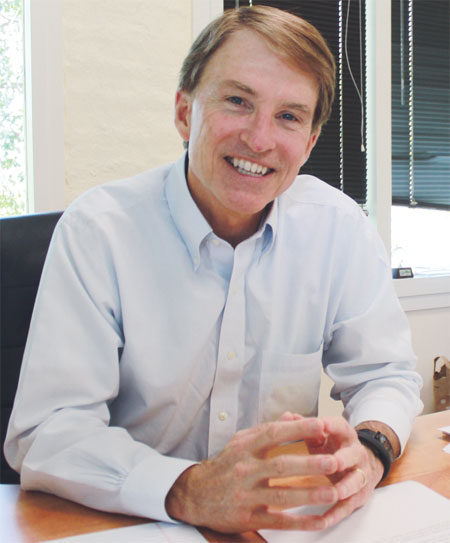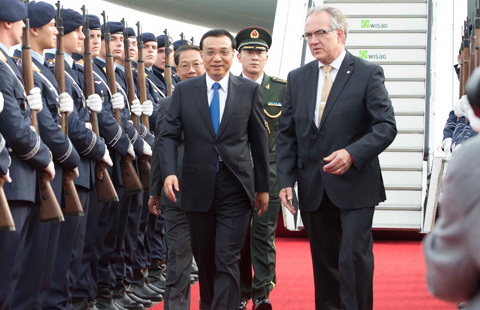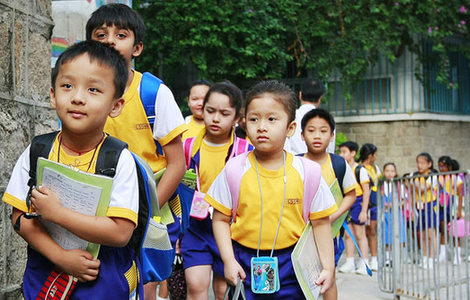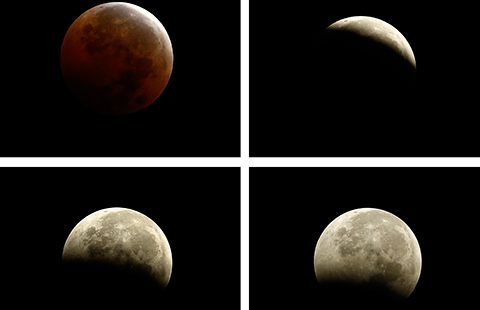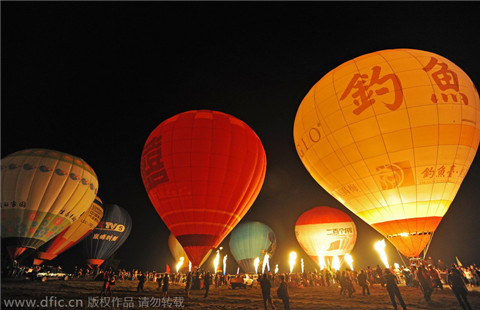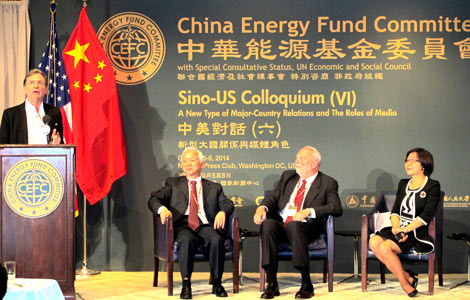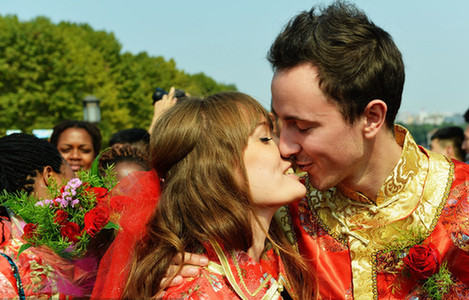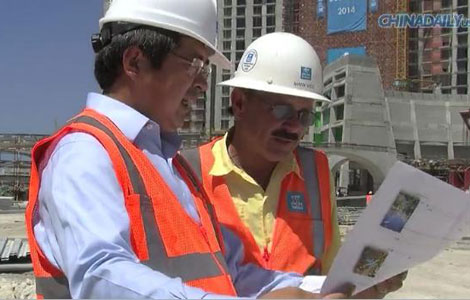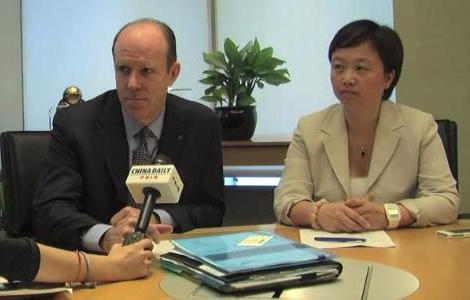Steve Westly: He wants to change the world
Updated: 2014-06-13 11:22
By Qidong Zhang in San Francisco(China Daily USA)
|
||||||||
|
Steve Westly, former California State controller and founder of the Westly Group, one of US' largest clean-tech venture capital firms, uses Chinese I-Ching philosophy Yin & Yang to describes his parallel career in politics and business. Qidong Zhang / China Daily |
A former executive at eBay, Westly developed marketing and business strategies to guide the company to its IPO. As one of the earliest investors and board members at Tesla Motors, he helped pioneer the rapid development of the electric-vehicle giant.
Also known as a political power player in Silicon Valley, Westly raised more than $500,000 for then-Democratic presidential candidate Barack Obama's 2008 campaign and $1.5 million for his re-election as president, and he has been a generous host for Obama and other major Democrats, including Vice-President Joe Biden and former Secretary of State Hillary Clinton.
When he and his wife were invited to a White House state dinner by Obama to meet with former Chinese President Hu Jintao during his state visit in 2011, Westly had a chance to chat with Hu on the importance of the US-China relationship. Today he has high regards for Chinese President Xi Jinping.
"I am very bullish on Xi (Jinping), and believe he is a strong leader who seeks positive relationship with the US; I think the time he spent in the US when he was young helps him understand our culture, our goals, and who we are as people."
His venture capitalist firm the Westly Group has managed a $300 million portfolio that has invested in more than 20 companies looking to solve pressing world problems with a focus on the clean-tech industry. He looks to expand his investment in the Chinese clean-tech market, especially after recently taking a Chinese waste-energy firm public on the Nasdaq exchange.
"I believe there will be tremendous opportunities in China in the clean-tech industry, and I have been watching China very carefully. As a business person and as an American, I want to see closer ties with China, more investment going both directions, more students studying across the borders. I am particularly interested in seeing more Americans learning Chinese language and culture," Westly said.
With his father growing up in the Philippines, Westly became interested in international politics at a young age. He studied history and international affairs at Stanford University as an undergraduate, and he did something most students did not do, take the Foreign Service officers exam.
Known for its competitiveness, the exam and includes an extensive three-hour written test and then - for those who pass - a highly competitive eight-hour oral exam. He was eventually selected, but chose to continue his MBA studies at Stanford Business School.
His interest in Chinese culture and history also was developed at an early age, partly because his mother was an expert in Asian art and Buddhism culture, and was a museum guide and expert on Asian culture at Stanford's Art Museum.
"I watched China going through extraordinary economic growth in the past few decades, with many of China's1.3 billion population being lifted from poverty. When I became California State controller and CFO in 2003, we were the world's fifth-largest economy, and China was the ninth. I am glad I had taken a leadership role in helping to increase the investments of California's two public investment funds in Asia and specifically in China. These investments have performed very well," he said.
Seeing both opportunities and challenges between China and US, Westly said both countries need to learn to communicate and address mutual concerns.
"The issue of air pollution and global air pollution is going to be bigger and bigger for policy makers of every country in the world. In the past, we think if one country has pollution it's their problem. But pollution today is a problem without borders," he said.
"California had a great pollution problem when I was growing up, largely caused by cars. So we did something very forward-looking in Los Angeles and San Francisco. We established catalytic converter legislation and cleaned up our cars. So for the next 25 years (early 1970s to early 2000), the air in our state is a lot cleaner. After 2000, however, we began to get more and more pollution from Asia.
"Today the EPA (Environmental Protection Agency) says we get 25 percent of our pollution over the West Coast from Asia. So the point is, this is not a China problem, or Mexico City problem or Kuala Lumpar problem; this is a global problem. So we have the same interest as China to work together and help each other on our environmental policies," he said.
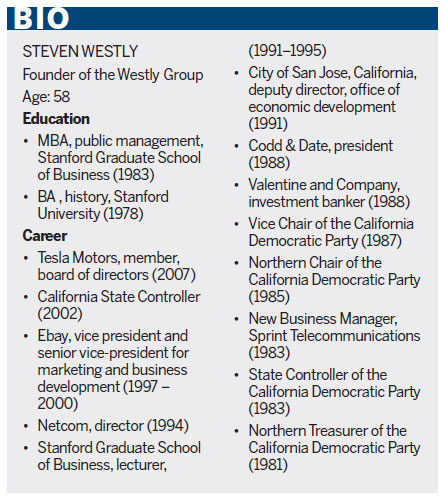
The key challenge, Westly points out, is to limit the use of coal, an energy solution that he said seems to have cheap input but very expensive output.
"Both the US and China develop coal mines and obtain coal for energy use because it is cheap. But we need to look at the cost of output, which is shortening lives, giving our children asthma, and killing people with lung cancer. We can't keep fooling ourselves on this because it is cheap, since the consequence has to be calculated," he said.
Westly emphasized the importance of closing down dirty coal plants by both China and US for the interest of the general public, and he said quicker measures have to be taken by the Chinese government for the use of solar and reusable energy.
"China, like us, needs to address these problems, that they must, just like the US, look at not only the low cost of the input, but also the public cost of the output and the cost their neighbors must bear as well. The good news is we believe Xi (Jinping) of China understands this problem very well and is moving very decidedly to build up innovation capacity," said Westly.
According to him, China installed 14GW of wind-power generation and 12 GW of solar-power generation last year, compared to 1GW of wind and 4.3 GW of solar in the US.
"China is the world's largest producer of hydro-electric power. Coal power still accounts for 65 percent of all energy consumed in China. The Chinese government's goal is to double wind-power capacity by 2020 - that is a model the rest of the world would be smart to follow," he said.
Electric vehicles are another solution to pollution, said the big promoter and investor in Tesla Motors. Westly believes the company's business model is one of the biggest clean-energy innovations in automobile history.
"China must deal with the issue that many people want cars, and how the government will allow that many people to have car ownership, which will eventually lead to worse pollution. The answer to that is to enforce higher standards of fuel-efficient vehicles, and I believe China will see a great leap forward in this area of development," he said.
He said the big leap forward is possible by looking at the US example. "Three or four years ago I spoke to people in the US about Tesla's electric vehicles; many thought I was crazy about cars running on batteries. Now people tell me they love Tesla, they want one and ask how soon they will get one. I believe the same thing will happen in China. Today we are already looking at our next great leap forward, which are driverless cars, autonomous vehicles. This will be great news for China since a substantial amount of the population has not grown up driving a car," he said.
Westly's other connection to China is his wife Anita Yu, who is originally from Hong Kong and "is still very Chinese by keeping Chinese custom and traditions." Proudly stating that both of their children - daughter Christie 14 and son Matthew 12 - speak Mandarin, he said part of his life philosophy is, "Happy wife, happy life."
His goal is "making the world a better place", Westly said and he hopes to do more public service when his children are older, since he spends quality time coaching his daughter's soccer and basketball team.
Once rumored to be the successor for former US ambassador to China Gary Locke, Westly believes his understanding of both business and government and international policies will benefit his future in government.
"I have great ambitions not only for our country but also for China," he said. "I've been in the government trying to implement policies to change the world. Now I am in the private sector and I want to see private companies change the world. We all have a responsibility to our children to make this world a better place."
kellyzhang@chinadailyusa.com
Most Viewed
Editor's Picks

|

|

|

|

|

|
Today's Top News
Premier pushes innovation on German visit
Beijing to keep the lid on air pollution for APEC
Li arrives in Germany, first leg of Europe trip
China's economy surpasses US
IMF: Shadow banking filling gaps
China's status prominent at 'Big Four' firm Ernst & Young
US Ebola patient dies
China's role grows in Gates Foundation tech push
US Weekly

|

|
